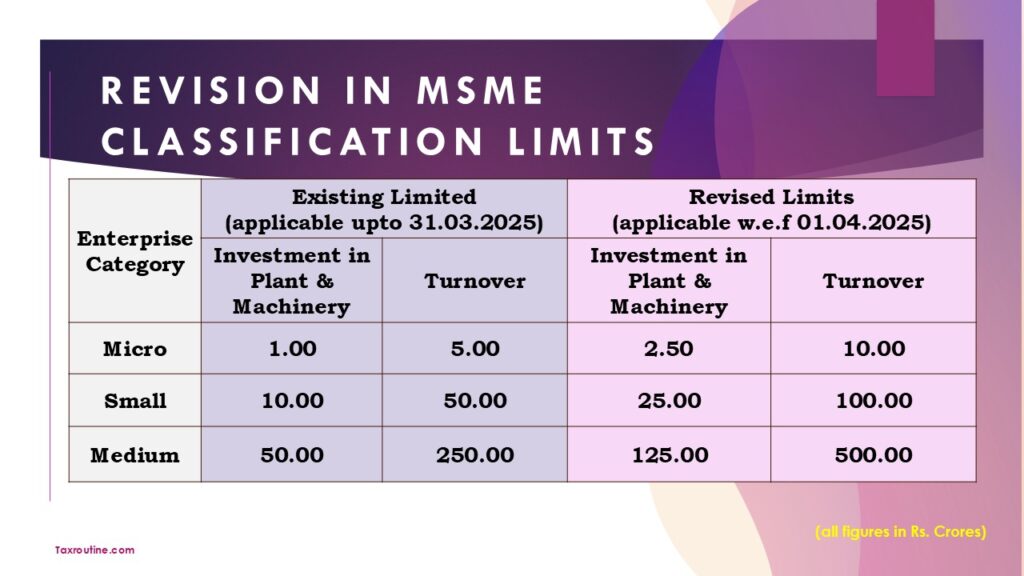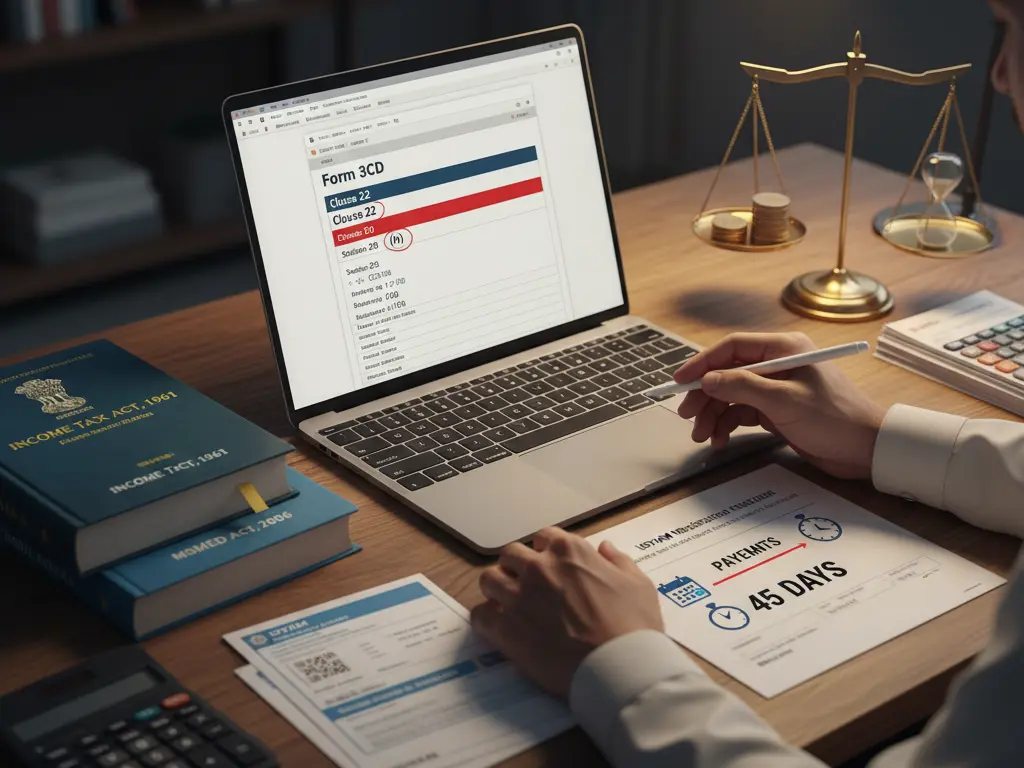The new provisions mandating timely payments to Micro and Small Enterprises (MSMEs) under the Income Tax Act, 1961, have reshaped the landscape of corporate finance and Tax Audit compliance. With the latest amendments to the Clause 22 of Form 3CD in Tax Audit Report MSME Payments reporting have taken the centre stage.
For both taxpayers and auditors, understanding the implications of this change, particularly the detailed reporting required in Form 3CD of the Tax Audit Report, is paramount to ensure compliance and avoid significant tax disallowances. This comprehensive guide delves into the specifics of this new requirement, the interrelation with the MSMED Act, 2006, and the critical steps for accurate reporting in the Tax Audit Report.
Legal Provisions
The introduction of Section 43B(h) by the Finance Act, 2023 (effective from Assessment Year 2024-25, i.e., Financial Year 2023-24 onwards), is a significant measure aimed at boosting the financial health of the MSME sector by promoting timely payments.
The Mandate of Timely Payment
Section 43B of the Income Tax Act operates on a ‘payment-basis’ principle for certain statutory expenses, allowing a deduction only in the year the payment is actually made, irrespective of the method of accounting followed. The new clause (h) extends this principle to payments due to Micro and Small Enterprises.
- The Rule: Any sum payable by the assessee to a Micro or Small Enterprise (as defined under the MSMED Act, 2006) for goods supplied or services rendered, which is unpaid beyond the time limit specified in Section 15 of the MSMED Act, will be allowed as a deduction only in the previous year in which the sum is actually paid.
- Crucial Exclusion: Payments due to Medium Enterprises are not covered by Section 43B(h).
- No Proviso Benefit: Unlike other clauses of Section 43B (like payments of tax, duty, or cess), the benefit of the first proviso—which allows deduction if payment is made before the due date of filing the Income Tax Return—is specifically excluded for Section 43B(h). This makes the adherence to the MSMED Act timeline absolute for claiming the deduction in the year of accrual.
Bare Act Provisions of Section 43B(h) of the Income Tax Act, 1961
43B. Notwithstanding anything contained in any other provision of this Act, a deduction otherwise allowable under this Act in respect of—
(h) any sum payable by the assessee to a micro or small enterprise beyond the time limit specified in section 15 of the Micro, Small and Medium Enterprises Development Act, 2006 (27 of 2006)
shall be allowed (irrespective of the previous year in which the liability to pay such sum was incurred by the assessee according to the method of accounting regularly employed by him) only in computing the income referred to in section 28 of that previous year in which such sum is actually paid by him
The MSMED Act Time Limits
Section 15 of the Micro, Small and Medium Enterprises Development Act, 2006 (MSMED Act) prescribes the maximum credit period:
| Condition | Payment Due Date |
| No written agreement with the supplier | Within 15 days from the day of acceptance (or deemed acceptance). |
| With written agreement with the supplier | As per the agreed-upon date, but in no case can the period exceed 45 days from the day of acceptance (or deemed acceptance). |
🔗 For latest definition and threshold limits of the MSME Entities, click here
Bare Act Provisions of Section 15 of the MSMED Act, 2006
15. Where any supplier, supplies any goods or renders any services to any buyer, the buyer shall make payment therefor on or before the date agreed upon between him and the supplier in writing or, where there is no agreement in this behalf, before the appointed day :
Provided that in no case the period agreed upon between the supplier and the buyer in writing shall exceed forty-five days from the day of acceptance or the day of deemed acceptance.
Tax Audit Report MSME Payments Reporting (Clause 22)
The Tax Auditor’s role is not just to quantify the disallowance but also to report the required particulars accurately in the Form 3CD (Statement of Particulars required to be furnished under Section 44AB).
Clause 22 Reporting
The most direct impact of Section 43B(h) is on Clause 22 of Form 3CD, which requires reporting of disallowable amounts under Section 43B. The revised Clause 22 now specifically incorporates a reference to Section 43B(h).
The Tax Auditor must meticulously review the list of creditors, identify Micro and Small Enterprises (MSEs) based on their UDYAM Registration Certificate or a formal declaration, and scrutinize the payment dates against the deadlines prescribed by Section 15 of the MSMED Act.
The amount to be reported as disallowance is the total sum payable to MSEs for which the payment has been delayed beyond the MSMED Act timeline and remains outstanding as of the balance sheet date (March 31).

Verification Challenges for Auditors
Auditors face significant practical challenges, including:
- Identifying MSE Status: Reliance on the assessee’s declaration and the supplier’s UDYAM registration certificate is essential. The auditor must obtain a list of suppliers with their MSME classification.
- Determining ‘Day of Acceptance’: Establishing the exact ‘day of acceptance’ of goods or services, especially in large businesses, requires robust documentation and internal controls, as the payment clock starts ticking from this date.
- Payment Terms: Verifying the written agreement’s payment terms to ensure they do not exceed the statutory 45-day limit.
Model Comments for Form 3CA/3CB
While the detailed reporting of disallowance under Section 43B(h) is done in Clause 22 of Form 3CD, the main audit report (Form 3CA for accounts audited under other laws like the Companies Act, or Form 3CB for others) requires the auditor to state their observations, qualifications, or comments on the financial statements and the particulars reported in Form 3CD.
Model Comment for Form 3CA (Part B, Clause 3) or Form 3CB (Clause 3(a))
| Scenario | Draft Auditor Comment (Model) |
| If all payments are timely (No Disallowance) | “Based on the records and information furnished by the assessee, and certified list of Micro and Small Enterprises, we confirm that all sums payable to Micro and Small Enterprises covered under Section 43B(h) of the Income Tax Act, 1961 read with Section 15 of the MSMED Act, 2006, were either paid within the prescribed time limit or there were no outstanding dues as on the balance sheet date for which the due date had expired. Accordingly, no amount is disallowable under Section 43B(h) read with Clause 22 of Form 3CD.” |
| If disallowance exists | “The assessee has outstanding dues to Micro and Small Enterprises as on March 31, [Year], for which the payment due date, as per Section 15 of the MSMED Act, 2006, has expired. The resultant disallowance under Section 43B(h) of the Income Tax Act, 1961, amounting to ₹ [Amount], has been reported in Clause 22 of Form 3CD. This amount shall be allowed as a deduction in the previous year of actual payment.” |
| If MSME Status is not determinable | “The assessee was unable to obtain conclusive proof (e.g., UDYAM Registration Certificate) from all suppliers to conclusively ascertain their status as Micro or Small Enterprises as defined under the MSMED Act, 2006. Consequently, the completeness and accuracy of the reporting under Clause 22 of Form 3CD, pertaining to Section 43B(h), is based solely on the information and declarations provided and certified by the management, which we have relied upon.” |
Statutory Disclosure Requirements Beyond Income Tax Act
Compliance regarding MSME payments is not limited to the Income Tax Act. Disclosure requirements also stem from other key statutes, reinforcing the need for meticulous record-keeping.
1. The Companies Act, 2013
- MSME-I Return: Specified companies must file a half-yearly return (Form MSME-I) with the Registrar of Companies (ROC) detailing outstanding payments to Micro and Small Enterprises that have been pending for more than 45 days.
- Financial Statement Disclosure (Schedule III): Companies must include a detailed disclosure in their annual financial statements as per Section 22 of the MSMED Act, 2006, which is mandated by Schedule III of the Companies Act, 2013. This disclosure includes:
- The principal amount and interest due and unpaid to suppliers as at the end of the accounting year.
- The amount of interest paid during the year beyond the appointed day.
- The amount of interest due and payable for the year of delay, which remains unpaid.
2. The Micro, Small and Medium Enterprises Development Act, 2006
- Interest on Delay (Section 16): If a buyer fails to make payment within the specified time, they are liable to pay compound interest with monthly rests at three times the bank rate notified by the Reserve Bank of India (RBI).
- Disallowance of Interest (Income Tax): It is important to note that any interest paid or payable to an MSME for delayed payments under Section 16 of the MSMED Act is considered penal in nature and is not allowed as a deduction under the Income Tax Act (generally covered by Section 37(1) read with the explanation to Section 37, though not explicitly mentioned in 43B(h)).
Conclusion
Section 43B(h) marks a fundamental shift towards enforcing payment discipline for buyers dealing with Micro and Small Enterprises. The Tax Audit Report, specifically Form 3CD, is the primary vehicle for enforcing this provision. Businesses must implement robust tracking systems to monitor the MSME status of suppliers and the precise payment deadlines. Tax Auditors, on their part, must exercise due diligence, ensure complete disclosure in Clause 22, and provide clear comments in Forms 3CA/3CB, thereby serving as the lynchpin in the government’s mandate to strengthen the MSME ecosystem. Ignoring these requirements is no longer an option; it is a direct path to mandatory tax disallowance.
📢 Now Offering Professional Tax Services!
We’re excited to announce the launch of our new Tax Services section! Whether it’s income tax filing, GST return support, or other compliance solutions, we’re here to help individuals, businesses, and NRIs navigate Indian tax systems with ease.
👉 Explore Our Tax Services

